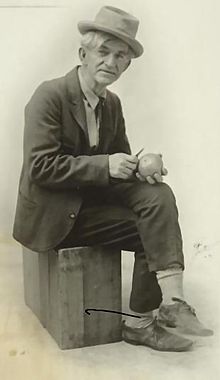Lightnin' (play)
| Lightnin' | |
|---|---|

Frank Bacon as Lightnin' Bill Jones
|
|
| Written by | Winchell Smith and Frank Bacon |
| Characters | Lightnin' Bill Jones |
| Original language | English |
Lightnin' is a comedy play in three acts by Winchell Smith and Frank Bacon. The play was produced by John Golden and directed by P. E. McCoy. With Frank Bacon in the lead role and billed as “A Live Wire American Comedy”, Lightnin' made its Broadway debut on August 26, 1918, at the Gaiety Theatre and played continuously over three seasons with a record breaking run of 1,291 performances. The show began its long national tour at the end of August 1921 and continued on for some time after Bacon’s death in November 1922. Lightnin' was revived in 1938 for a two-month run at the John Golden Theatre with Fred Stone playing Lightnin’ Bill Jones and was adapted for cinema twice in films starring Jay Hunt (1925) and Will Rogers (1930).
The story takes place in the mythical town of Calivada where Lightnin' Bill Jones, or more correctly his wife, operates a rather seedy hotel that straddles the California-Nevada state line convenient for those looking for a quick Nevada divorce. He is nicknamed Lightnin’ because, as the local postmaster put it, “We call him Lightnin’ because he ain’t.”
Lightnin’ Bill, a Civil War veteran known to brag that he advised General Ulysses S. Grant, also claims to be a jack of all trades, having been at one time or another, a judge, inventor, detective and bee keeper. Of the latter profession he spins the tale that he once drove a swarm across the prairie in the midst of winter without the loss of a single bee. When pressed Lightnin’ Bill concedes that during the drive he may have been stung once or twice.
Lightnin’ Bill likes to spend his days and nights carousing with cronies rather than being at home with his wife and adopted daughter. When he refuses to go along with the sale of the hotel to group of out-of-town businessmen, his wife becomes furious and files for divorce. In court Lightnin’ Bill, with the help of young John Marvin, is able to prove that the buyers are unscrupulous scoundrels and wins back the love of his wife.
...
Wikipedia
